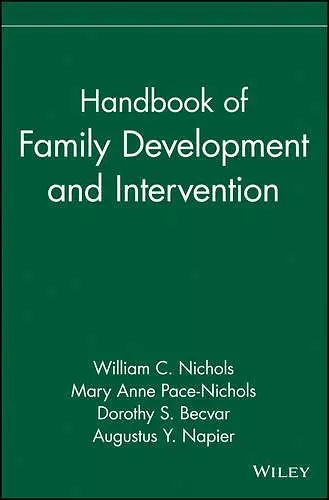Handbook of Family Development and Intervention
Dorothy S Becvar editor William C Nichols editor Augustus Y Napier editor Mary Anne Pace-Nichols editor
Format:Hardback
Publisher:John Wiley & Sons Inc
Currently unavailable, and unfortunately no date known when it will be back

Like all complex living systems, a family, during its life course, proceeds through predictable stages of development. Yet every family is different, its uniqueness defined and continually redefined by an open-ended array of structural, biological, and sociocultural variables. And, as with all living things, a family's continued well-being depends upon its ability to adapt to changes arising from both within the family system and without.
First postulated in the 1940s, these basic ideas constitute the conceptual core of modern family development theory. From them has blossomed an impressive body of knowledge about family health and illness, without which much of the progress occurring in family therapy over the past half-century would not have been possible.
This book does much to promote continued progress in the practical application of family development theory by affording family therapists an unparalleled opportunity to acquaint themselves with the most important trends in family development theory to emerge over the past decade.
In it you will find contributions from leading theorists, researchers, and clinicians, arranged so as to provide a systematic treatment of the latest thinking on family development seen from both the systemic viewpoint and that of individual members of the system.
Comprehensive in scope, this book explores the patterns, processes, and dynamics inherent in "traditional" families, as well as in important structural variants such as single-parent and gay and lesbian families and families with special needs and problems, including divorce, physical abuse, and disabilities.
Since progress in the social sciences is as much about formulating viable new ways of seeing as it is about determining quantifiable facts, the editors offer equal time to an array of influential and sometimes radically conflicting schools of thought, including sociobiology, social psychology, constructionism, multiculturalism, postmodernism, and feminism. Mainstream family therapists will find much in this handbook that they will consider controversial. In some cases readers may even be outraged by the views expressed. Yet, thanks to the high caliber of scholarship, intellect, and professionalism evidenced throughout, none of the ideas advanced in Handbook of Family Development and Intervention can be easily dismissed, and all have something of value to offer the thoughtful, dedicated family therapist.
Handbook of Family Development and Intervention is a valuable professional resource for all couples and family therapists. It...
"A well conceived and worthwhile resource for the family therapy academic or practitioner." (The Family Journal, January 2002)
"The expertise made available by the authors is both broad and deep. All hold clinical as well as scientific credentials. The editors' broad network was an important resource in recruiting authors. Bill Nichols and Mary Anne Pace-Nichols are long time authors, academicians, and leaders in the fields of family studies and MFT. Dorothy Becvar is a well-known leader and author. Gus Napier is near legend among MFT's as a result of the 'Family Crucible'. This group of Editors did an excellent job of organizing the authors' work into a text that fills a large gap in the literature." (Journal of Marriage and Family, Feb 02)
ISBN: 9780471299677
Dimensions: 261mm x 186mm x 40mm
Weight: 1078g
504 pages